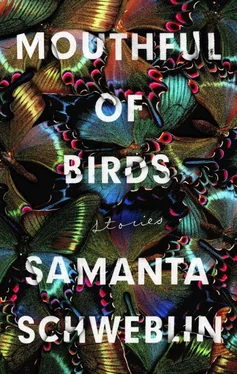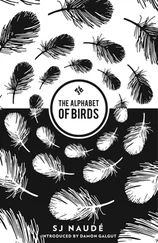“No,” she said. “I don’t think tomorrow is a good idea. I’m sorry.”
• • •
When the woman on the cot went to the city, she was twenty years old. She was pleased to see that the houses weren’t raised on wooden stilts, so floods and fishermen were ruled out. The city also seemed warm to her, and it made her a little dizzy those first days. On Sundays she called her mother and told her some things about her week. Sometimes she lied. She didn’t do it out of malice, but rather to distract herself. She told her mother that she’d gone out with new friends. Or that she’d gone to the movies. Or that she’d eaten some delicious food in a neighborhood restaurant. The mother seemed to love these stories. And sometimes she couldn’t wait to hang up, so she could repeat them over the phone to the aunt as well.
The woman on the cot had some savings and had signed up at a community college. But the expenses of food, rent, and school were very high, and soon she had to interrupt her studies and look for a job. One afternoon she was out buying bread, and the woman at the shop, to whom she sometimes told her problems, said that she had just the job for her. She said it would pay good money and leave her plenty of time to study. The woman on the cot wasn’t stupid. She knew the job could involve something unpleasant that no one else would want to do, or that it could be dangerous. She said she couldn’t make any promises, but she was interested in finding out what it was.
The shop owner drove her to a nearby avenue and stopped in front of a two-story building with a sign that said INSTITUTE. Inside, there was a small throng of women. One of them, wearing a peach-colored uniform that also said “Institute,” asked the women to form a straight line, and threatened not to reserve a turn for them if they were disorderly. The women quickly got organized. Another woman in a uniform recognized the shop owner and came right over to them. She led them into another room and asked the woman on the cot to roll up her pants so she could see the hair on her legs. At first the woman on the cot thought she hadn’t understood the request. But it was repeated. Then she thought it was ridiculous, and that this was surely not a job for her. But neither did she see the danger in showing her leg hair to the uniformed woman, so she rolled up her pant leg and showed her. The woman in uniform put on her glasses and studied the hairs, taking a small flashlight from her pocket and shining it on them. She assessed the ankle, where the hairs were not very thick, and also the calf. Only when she seemed convinced that the woman on the cot would do did she explain the job, giving a general description and the salary. The woman on the cot didn’t know what to say. The job was very simple and the pay was acceptable. Her mother had talked to her so much about the traps that were everywhere in the city that she tried for some seconds to figure out where the danger or the deception could be. But it still seemed like a fine offer. And she accepted.

When there are no more hairs left, the legs look red and raw. The woman on the cot doesn’t move. The six women around the legs look tired but satisfied. They lean back in their chairs, sigh, rest their hands in their laps. The assistant gathers up the hand towels where the women collected the hairs. Before picking them up, she folds them in half twice so that none of the hairs are lost, and she deposits them carefully into a bag that she closes with a double knot once it’s full. Only then does she help the women stand up, pulling back their chairs, sometimes adjusting their shirt collars or any shoulder pads that may have shifted out of place. Then she picks up the bag, delicately, taking care not to tip it, opens the door, and goes with the women to the changing room. When they are all inside, the assistant goes back into the hall and closes the door behind her. Sometimes the women comment on the shift, laugh, or ask questions about previous sessions, and the assistant listens to them chat as she goes down the white stairs. She knows she must store the bag safely before returning to the woman on the cot.
• • •
The assistant was born in the country, in a family that made its living from crops and vineyards. They had an estate with a large main house surrounded by gardens, and a small fortune. The assistant liked fish, and her father, who was almost never home, used to send her enormous books with color illustrations of all the fish in the world. She learned their names and drew them in her notebook. Of all the fish, her favorite was one called the Olingiris. Its body was short and thin, it had a long, tube-shaped mouth, and it was turquoise and yellow. The books said it was a delicate fish, because it ate only coral polyps, and those weren’t found just anywhere. She asked for one, but it was explained to her that they couldn’t have a pet fish in the countryside. The assistant showed her mother a book that explained how to install and maintain a fish tank, but the mother told her that even if they got the tank and the right food, the fish would die of sadness. The assistant thought perhaps her father wouldn’t have the same opinion, that maybe she could show him the pictures and he would understand. But when he finally came home, she couldn’t find the book anywhere.
The assistant had many brothers, but they were older and worked with her father, so she spent most of the day alone. When she turned seven, she started attending a rural school. One of the men who worked for her father came to pick her up at seven-thirty, dropped her off at school at eight, and came back for her at twelve. It wasn’t easy for the assistant to adapt to that new rhythm. At first she didn’t do well. Then her mother hired a private tutor, and the assistant started to study in the mornings at school and at home in the afternoons. The private tutor knew of the assistant’s interest in fish, and she built her exercises around that subject. Sometimes she read poetry, and once when they were studying punctuation she proposed that the assistant write some verses. The assistant gave it a try, and the tutor seemed delighted with the result. As homework, she assigned the assistant to write a poem with the names of her favorite fish. The assistant cleared off her desk and set out just a few blank sheets of paper, a pencil, and an eraser. She wrote a poem about fish, but invented fish. She wrote about what she felt sometimes in the morning, when she was just waking up and sometimes didn’t fully know who she was or where. About the things that made her happy, about the things that didn’t, and about her father.
One afternoon the tutor told the assistant that she had a surprise for her, and she took a very large package from her bag, the size of a folder or bigger, and gift-wrapped. Before letting her open it, she made the assistant promise that it would be a secret, and that she would never tell anyone about the gift. The assistant agreed. She tore off the paper, and when she saw what it was, she thought her whole life wouldn’t be long enough to repay the tutor for this gift. It was the book about fish and fish tanks. Not the same one, but one just like it, new, identical.
By the time she turned twelve the assistant’s level had improved a lot, and her mother decided the private tutor was no longer necessary. For a while, the assistant drew her among the fish. She made some drawings of the tutor kissing the Olingiris, and another of the tutor pregnant with an Olingiris’s baby. She wrote some poems for her mother to send to the tutor, and her mother promised to mail them, but there was never a reply.
When the assistant finished high school, she started to manage her father’s finances and to oversee some things in the fields. She didn’t paint or write anymore, but on her desk she had a framed photo of the Olingiris, and sometimes, when she was taking a break, she picked it up to look at it closely, and she wondered what the private tutor was doing, and what it was like to live the way an Olingiris lived.
Читать дальше









![Саманта Швеблин - Дистанция спасения [litres]](/books/427178/samanta-shveblin-distanciya-spaseniya-litres-thumb.webp)



